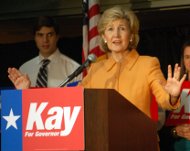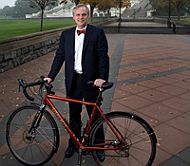In case the taxpayers need any more reasons to dump the current leadership at TxDOT, here’s the most blatant one yet. In the Express-News article below about the supposed demise of the Trans Texas Corridor, Commissioner Ted Houghton, ya know, the one who called TURF Board member Hank Gilbert and TURF supporters “bigots” (watch it here) for opposing the sale of Texas roads to foreign corporations in sweetheart deals, accurately claims:
“I am Ted Houghton, the most arrogant commissioner of the most arrogant state agency in the history of the state of Texas.”
Rick Perry is using his Transportation Commission appointee as a diversion from his own arrogance in ramming his Trans Texas Corridor down Texans’ throats. Who better to take the knocks for Perry than his most despised Commissioner who picked up where former Chairman Ric Williamson left off. While the circus was distracting from the real issue of Perry repeatedly wielding his veto pen to benefit his cronies when Texans, through their elected representatives, attempted to shut the TTC down, few understand the technical significance of the method Perry is using to continue TTC-35 despite the announcement.
Rather than simply send a letter to the Federal Highway Administration (FHWA) to close the Trans Texas Corridor file for good, Perry is taking 4-6 months to take public comment (I guess over 10,000 people against at the hearings weren’t enough) and seek a Record of Decision on the project depsite the claim they’re not going to build it. What this does is allow TxDOT to change its mind and come back later to resurrect the project (after the Republican primary perhaps?) at any time.
Also, nowhere does the article below or any of the others we’ve seen question how TxDOT can possibly claim the taxpayers are only out $16 million for environmental work when a State Audit report in 2007 said the taxpayers had already paid $60 million (for engineering, environmental work, and legal fees, and it was found 21 of 32 invoices pulled were mismarked engineering when it was really spent on PR!) for TTC-35 just through 2006.
So, we’re supposed to believe Cintra just walks away from a potential $186 billion deal, for which it paid $3.5 million to develop? Considering Senator John Carona saw to it that a STATE LAW was changed to lift the cap on payments to LOSING BIDDERS earlier this year just so Cintra could get paid $3.6 million for losing its grip on the 121 toll deal in Collin/Denton counties, how can anyone expect us to believe that buried among the 1,000 pages of financial documents and termination clauses in the TTC-35 contract that Cintra is going to get NOTHING but the two segments on SH 130, a loop around Austin, when the State kills the deal? Yeah right! Somewhere there’s a BIG, FAT taxpayer liability looming on the horizon that we’re not going to hear about until AFTER the next election…
The only sure way to be rid of this looting? Dump Rick Perry!
____________________________________________
Link to article here.
Money flows on road that went nowhere
More money — perhaps millions more — will be spent as Texas closes the environmental review process and gets public comment on the recommendation to the federal government, state transportation officials said Wednesday.
They said the planning expenditures weren’t wasted because they can use the information in the future: “It will be our asset. It will be ours,” said Transportation Commissioner Ted Houghton of El Paso.
Critics were quick to call it a waste.
“Texans shouldn’t be forced to pay a tax for (Gov.) Rick Perry’s arrogance in pushing a project that nobody wanted but Rick Perry,” said Joe Pounder, spokesman for U.S. Sen. Kay Bailey Hutchison, who’s challenging Perry for the GOP nod for governor.
The $59.4 million in expenditures that the Texas Transportation Commission reported to lawmakers at the end of fiscal year 2008 went for planning, environmental reviews and engineering studies. The expense was part of $131 million spent on several segments since 2004.
Houghton said in weighing costs, one should consider a separate agreement with Spain-based Cintra and Zachry Construction Corp. of San Antonio.
Their partnership paid the state $25 million for the privilege of building State Highway 130 and collecting tolls on it, Houghton said. He said that infrastructure is worth $1.2 billion.
Any significant effort to address congestion relief on Interstate 35, including financing, now is an open question.
The I-35 parallel was among the last vestiges of the once-ambitious Trans-Texas Corridor championed by Perry as a network of highways, rail lines and utility corridors that would criss-cross Texas and relieve congestion.
The idea relied heavily on public-private partnerships and tollways since highway tax dollars are falling far short of the need.
Opposition from groups including landowners prompted transportation officials earlier this year to drop the Trans-Texas Corridor name and declare they’d scale back the network idea.
Now State Highway 130 in Central Texas and the proposed Interstate 69 from Brownsville to Texarkana are its last remnants.
Democratic candidate for governor Hank Gilbert, noting January’s announcement, said he suspects the demise of the corridor has been slow because there are additional costs associated with it: “Vampires die quicker than Rick Perry’s transportation policy.”
Perry and others have challenged critics to come up with an alternative, workable transportation plan. Hutchison and Gilbert haven’t yet disclosed plans; their campaigns say they will.
Activist Terri Hall of Texans Uniting for Reform and Freedom is among those unconvinced that the Trans-Texas Corridor is dead, noting lawmakers didn’t remove the idea from state law this year, plus the continuation of I-69.
“The Trans-Texas Corridor is not dead until Rick Perry is no longer governor of the state of Texas,” she said.
State officials said they remain committed to expanding Interstate 35 to three lanes each way from Austin to the “Y” in Hillsboro. It’s currently that wide from San Antonio to Austin. They’ve identified some money for the effort, including stimulus money, but still lack $1.5 billion.
Any further effort to create loops around cities, a parallel to I-35 or other congestion relief will be looked at regionally by committees focusing on their area’s segment, Houghton said.
Transportation officials largely blamed themselves for not properly marketing the plan. Houghton, in a reference to the way the agency was portrayed by anti-corridor and anti-toll activists, as well as Hutchison, introduced himself at Wednesday’s news conference this way: “I am Ted Houghton, the most arrogant commissioner of the most arrogant state agency in the history of the state of Texas.”


 The US Senate on Thursday voted to renew a prohibition on the tolling of existing freeways in the state of Texas. The measure was adopted as part of a larger $123 billion transportation appropriations bill for fiscal year 2010, which passed the House in July.
The US Senate on Thursday voted to renew a prohibition on the tolling of existing freeways in the state of Texas. The measure was adopted as part of a larger $123 billion transportation appropriations bill for fiscal year 2010, which passed the House in July. A Member of Congress proposes to use taxpayer money to fund the development of technology to track motorists as part of a new form of taxation. US Representative Earl Blumenauer (D-Oregon) introduced H.R. 3311 earlier this year to appropriate $154,500,000 for research and study into the transition to a per-mile vehicle tax system.
A Member of Congress proposes to use taxpayer money to fund the development of technology to track motorists as part of a new form of taxation. US Representative Earl Blumenauer (D-Oregon) introduced H.R. 3311 earlier this year to appropriate $154,500,000 for research and study into the transition to a per-mile vehicle tax system.